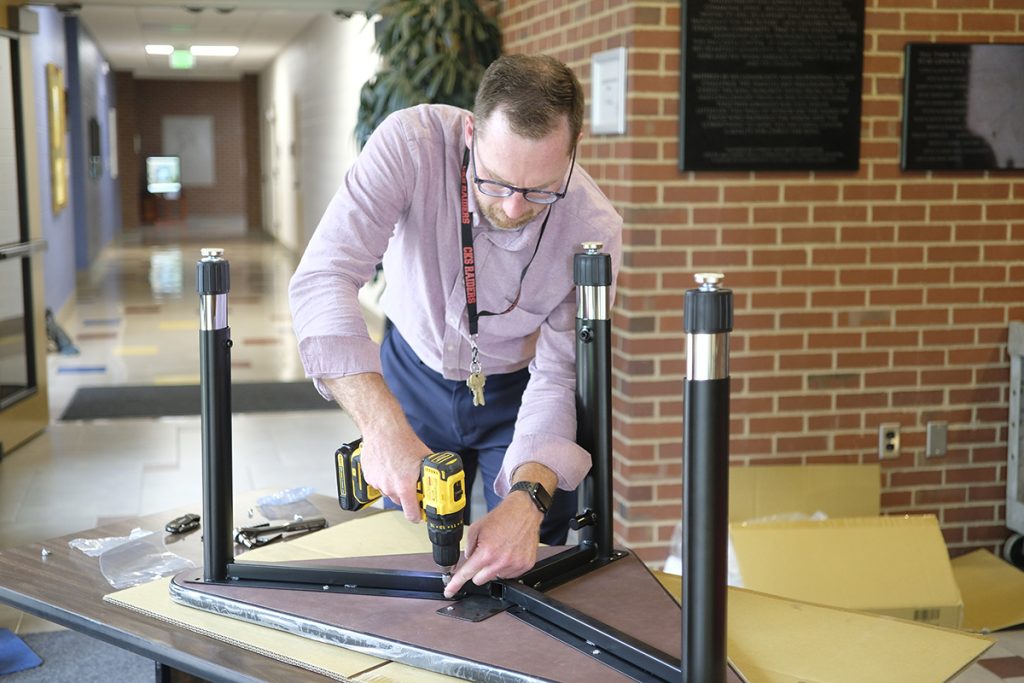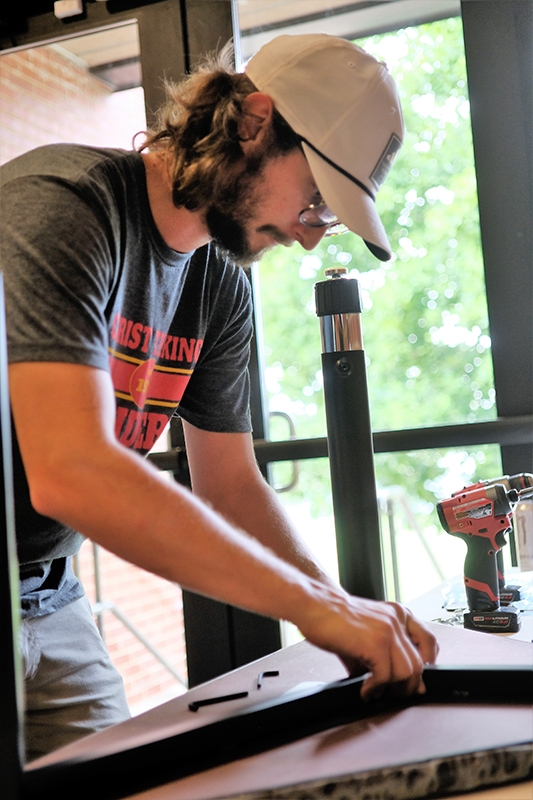
From new desks to Promethean interactive smartboards and from adaptive learning platforms to security systems, the schools of the Diocese of Nashville will be starting the 2023-24 school year off strong thanks to Governor’s Emergency Education Relief (GEER) grants announced earlier this spring.
“The GEER monies is an incredible opportunity to provide our schools with resources they need to best serve our students. I am extremely grateful for our Catholic school leaders who have worked so hard to submit that grant application for funding when they were working on so many other priorities,” said Tony Bonta, Catholic Schools Office administrator. “Their efforts demonstrate their commitment to strive for best practices and provide resources for our students to pursue excellence in Catholic education and formation in the Diocese of Nashville.”
GEER is a grant using unspent COVID-19 relief funds that were originally available as part of the Emergency Assistance for Non-Public Schools (EANS) program launched during the pandemic. Under the American Rescue Plan, $63 million in unobligated funds were shifted to the GEER program.
The funds, which can be used for purchases related to the COVID-19 pandemic, have been equally distributed amongst all interested non-public schools, based on the number of their eligible students in pre-kindergarten 3 through 12th grade.
Applications opened on April 1, 2023, and closed April 28, 2023. Once all projects were approved, the Tennessee Department of Education partnered with contractors to set up the services and goods each school applied for, to be completed between July 1, 2023, and Sept. 30, 2024.
Christ the King School in Nashville received more than $390,000 in GEER funds to purchase 200 desks, curriculum and learning packages with Renaissance Learning and IXL, and the necessary materials needed to renovate the school’s science lab.

“GEER has been transformative for the schools. These are projects or initiatives that for many principals, including myself, were dreams, and so it’s bringing some dreams to reality,” said Alan Mila, principal of Christ the King. “To renovate the science lab space or, in the case of other schools, bring in technology that the students and schools wouldn’t have otherwise, it’s going to transform learning and really make up ground lost during the pandemic that our students were so impacted by.”
St. Pius X Classical Academy took its more than $100,000 in funds to purchase eight Promethean interactive smartboards and 80 Chromebooks, which brings the entire school to a one-to-one learning environment. Additionally, they purchased Friendzy, MobyMax, Newsela, and QuaverEd curriculums and subscriptions, as well as professional development to learn the curriculums, and hired a new tutor who will be on campus three days a week for five hours a day.
“The best part of all of this is I think it’s going to benefit both the students and the teachers,” said Samantha Kaufman, principal of St. Pius X. “It’s definitely going to make things more engaging, interactive, and meaningful.”
St. John Vianney School in Gallatin had the same ideas as both Christ the King and St. Pius X when deciding how to use its $201,000 in GEER funds. The school purchased 50 new iPads, 55 new Chromebooks, new desks and chairs for students and teachers, as well as teaching supplies. It also purchased a security film for all the windows and glass doors.
“A lot of our teachers were making the best out of what they had, but I think having these new materials will help them reach more of their potential,” said Brady Forrest, principal of St. John Vianney. “They’ll have the things they want and the things they know will help benefit the kids in the class versus just finding things here and there that they have in place.”
“GEER opened up another door that we wouldn’t have been able to open before, and I think it’s great,” he added. “It takes a lot of strain off the schools and families.”
While St. Patrick School in McEwen, which received around $248,000, also purchased seven Promethean smartboards as well as new laptops for all the teachers, the biggest portion of its funds were allocated to updating security at the school. That includes installing a camera system, a key fob system, installing a perimeter fence, and getting a new fire panel.
“These security upgrades will help our teachers to feel safe while they teach, help our children to feel safe while they learn, and help our families have more confidence that their loved ones are safe on our campus,” explained Sister Veronica Marie Buckmaster, OP, principal of St. Patrick. “It will help take a level of anxiety down and therefore help learning.”
As for the new technology, “we have never had Promethean or smartboards, so our faculty is really excited to have this new technology,” said Sister Veronica Marie. “It will assist teachers in making lessons more interactive, and it makes it more engaging for students, which furthers their learning.
“My hope is that the added security and technology boosts teachers’ morale,” she added, noting the new teacher laptops that the grant also provided. “Our teachers have been through a lot during COVID and the Humphreys County flood” in August 2021.
“To give them these tools to really help them be the professionals and the educators that they are gives us an opportunity to show our appreciation for how they are walking with our students as their educators,” she concluded. “When our teachers feel supported, then our students are supported.”
Knowing that the government supports the education of their students helps, too, the principals agreed.
“It shows that they are committed to the education of all students,” Mila said. “I think that they understand that non-public schools, whether it be parochial schools like ours or other faith-based schools or non-faith-based private schools, all have a place of educating our Tennessee students. They understand that we play a pivotal and vital role in educating students just as the public schools do.”
The GEER grant “says that the governor and those who work with him also recognize that children in non-public schools are also citizens and have also been affected by COVID,” Sister Veronica Marie added. “Recognizing the negative fallout from that and in supporting them in their education and their parents and their choice of education, it affirms that we, too, are contributing greatly to the future of our state and the future of our country.”









